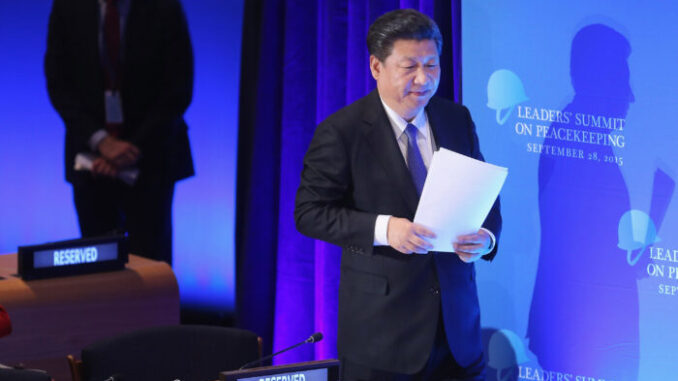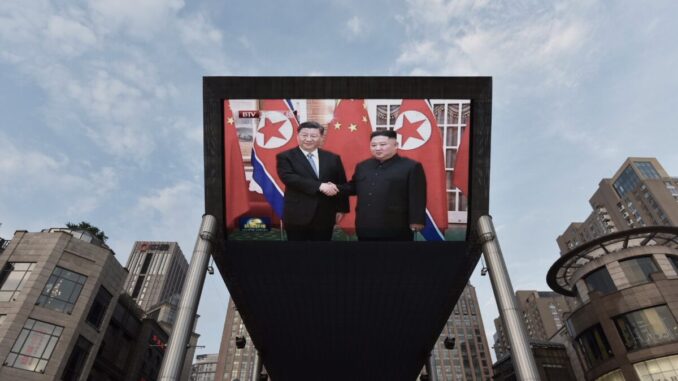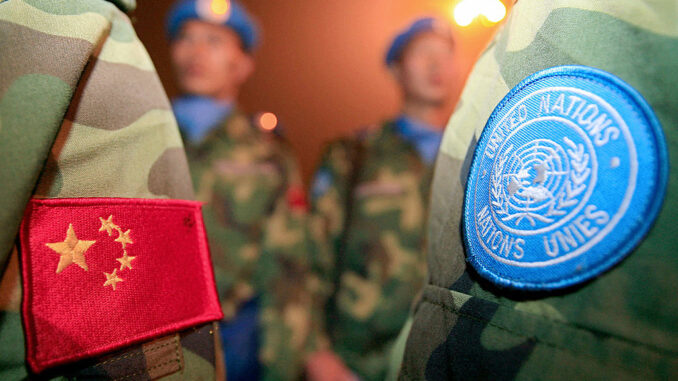By

Chinese leader Xi Jinping prepares to address the Leaders’ Summit on Peacekeeping at the 70th annual UN General Assembly at the UN headquarters in New York on Sept. 28, 2015. (Chip Somodevilla/Getty Images)<
>
The United States and its allies faced a China blockade at the UN on March 17 when they tried to spotlight the dire human rights situation and increasing repression in North Korea.
Russia joined China in what analysts increasingly see as a trend of multi-faceted sabotaging of the United Nations–its principles, practices, and institutions.
Experts have told The Epoch Times that China’s operations at the United Nations are a well-thought-out strategy for molding the international body for its purposes and challenging U.S. global leadership.
“As a P-5 country of the UN Security Council, China has always taken the advantage of its position to use the veto either to obstruct the key resolutions or to support it to take advantage of the politics that it feels could exemplify its national interest,” said Dr. Jagannath Panda, Head of Stockholm Center for South Asian and Indo-Pacific Affairs at the Institute for Security and Development Policy (ISDP), in Sweden.
Last month’s veto episode was not the first time China and Russia came to North Korea’s support. Last year, the two allies used their veto powers to disallow the adoption of a resolution tightening sanctions against North Korea over its recent ballistic missile launches.
China, the second largest donor to the UN after the United States, has been doing similar things elsewhere. It has continuously rescued the Syrian regime and, until 2020, vetoed the Security Council’s most severe and potentially effective draft resolutions to deter the government 16 times, according to the Syrian Network for Human Rights (SNHR).
Russia joined it in those vetoes, which SNHR alleges contributed to killing a quarter of a million Syrians.
The allies vetoed two resolutions regarding Syria in the Security Council in July 2020 and blocked the appointment of a French national as a special envoy for Sudan.
Experts say that the vetoes are just the tip of the iceberg. China’s self-aggrandizing operations at the UN include a complex matrix of factors like increasing Chinese funding for UN departments, programs, and initiatives; appointing Chinese at executive-level, strategic positions; and furthering the leadership control of some of the most influential agencies.

Xi’s ‘Shared Future’ Goal
At the core of China’s last decade of operations at the United Nations has been a “Shared Future” global governance vision, a Sino-centrist approach first published on Oct. 18 by Xi Jinping for a “community of common destiny for mankind.” Since then, Xi has expounded it on various occasions and in multiple forums, including two speeches at the UN in 2015 and 2017.
Analysts say this vision forms the blueprint for the non-kinetic warfare between the United States and China at international forums and organizations like the UN for a futuristic global system.
Experts Courtney J. Fung and Shing-hon Lam said in an analysis for The Lowy Institute late last year that China is using its ‘shared future’ global governance vision to reform the UN system from within—an agenda which, according to them, “downplays universal values in favor of championing the primacy of states.”
The Shared Future global governance vision by China consists of three proposals: Global Development Initiative (GDI), Global Security Initiative (GSI), and the Global Civilization Initiative (GCI), according to H.E. Li Qiang, the Premier of the State Council of the PRC.
“These initiatives are China’s proposals for global development and governance,” claimed Li Qiang at the Opening Plenary of The Boao Forum for Asia Annual Conference on March 30.
However, Fung and Lam said that under the guidance of the “shared Future,” China is attempting to enact its foreign policy approach within and upon the UN system.
“The PRC’s ‘shared future’ concept is purposely nebulous and all-encompassing as a vision to showcase the superiority of China’s authoritarian system over democratic systems,” said the Lowy Institute experts.
Li talked about the “Belt and Road cooperation” (BRI), which he termed as “high quality” in the context of a “shared future” and boasted that it has helped developing countries achieve “faster development” and opened up new space for the growth of the world economy.
Rahul Sur, a former UN official, said in an interview on March 20 that Beijing has “hitched” the BRI to the Sustainable Development Goals (SDG) for influence and power.
Sur worked with the UN for more than two decades and held vital appointments, including the Chief of Peacekeeping Evaluation in the Office of Internal Oversight Services, and Chief of Conduct and Discipline in the Office of the Special Representative of the Secretary-General (SRSG) in the UN peacekeeping mission in Haiti, recently said in the interview with author, Rajiv Malhotra on “Infinity Foundation” that all the UN organizations are committed to SDG for the countries to progress.
“And the Chinese contention is that if you join the Belt and Road Initiative, you will progress faster towards the Sustainable Development Goals. That is the Chinese selling line, that is their sales pitch,” said Sur adding that in this context, BRI gets a global policy endorsement, and even the Secretary-General has praised Beijing for “international cooperation and multilateralism.”
However, the global policy endorsement of the BRI under SDP doesn’t consider the Center of Global Development’s caution and other expert policy appraisals about BRI being unsustainable for certain countries because of the risk of debt distress, said Sur.
He was talking about a paper (pdf) by John Hurley, Scott Morris, and Gailyn Portelance that studied 68 BRI countries and found that 23 countries were at risk of debt distress at the time of the study, while 8 countries were in debt distress due to future BRI-related financing.
Fung and Lam said that the overall situation arches toward the United States becoming increasingly more “reliant” on the Chinese in the United Nations for general contributions. At the same time, Beijing uses a “combination of levers” to upraise its position within the international body.
Brandon J. Weichert, a U.S.-based geopolitical analyst and author of the book “Winning Space: How America Remains a Superpower” told The Epoch Times that the UN is thoroughly compromised by “malign Chinese influence” and the geopolitical tug of war between China and the United States is amply visible at the UN.
“The Chinese are encircling the U.S. in a reverse containment strategy from the Cold War. China is playing the part of the Americans, and the United States, sadly, seems to be playing the role of the Soviet Union,” alleged Weichert.
He cautioned that the first battles in this “non-kinetic war” between the United States and China for the future of the world system would be waged in the “sterile halls” of the UN and other internationalist bodies.

Increased Funding
China’s increased funding for the UN, its institutions, and initiatives are at the forefront of Beijing seeking an international leadership role while the United States continues to delay fulfilling its financial obligations to it, say experts.
“China has spent gobs of money and many years laying the groundwork for the quiet takeover of the United Nations (and other internationalist bodies that the United States created following their victory in the Second World War),” said Weichert.
Since member states’ financing of UN agencies comes in the form of “accessed and voluntary payments,” with its growing economy, China’s share to the UN has rapidly increased from 2 percent in 2000 to 15.25 percent in 2022 and is expected to continue to grow in the next decade, according to a report by Andrew Hyde for The Stimson Center.
Under international law, the United States, on the other hand, is obligated to pay 27.89 percent of the U.S. budget. Still, cumulative to the domestic debate on this contribution, the country has accumulated a sizeable debt of $ 1 billion, according to another report by Hyde.
“Although the Biden Administration has sought over the past year to muster sufficient political will to pay off outstanding debts for accumulated UN regular and peacekeeping arrears and make full payments earlier in the financial year, the U.S. Congress has once again proved unwilling to provide the necessary funds,” said Hyde.
In this context, while Beijing has taken up a stance on meeting its financial obligations, it has also kept criticizing the United States, said Hyde.
Weichert accused Beijing of using money to buy influence and image and said that achieving these things had warped the institutions that America built after WWII, so they serve Chinese, rather than American, interests.
“Just look at how the World Health Organization(WHO) behaved during the COVID-19 pandemic: they refused to hold China accountable either for the potential creation of the disease or for covering up the disease outbreak. Why? Because China was a primary benefactor for the WHO, and the organization depended on Chinese largesse to function properly,” said Weichert.
According to Hyde, China was also quick to learn from the United States the strategic and practical value of voluntary funding in critical areas.
Beijing partnered in 2016 with then-UN Secretary-General Ban Ki-Moon to establish the United Nations Peace and Development Trust Fund (UNPDF), agreeing to fund it with $200 million in additional voluntary contributions over 10 years. It was evenly divided between a Peace and Security Sub-Fund, for financing UN projects and activities related to maintaining international peace and security and a 2030 Agenda for Sustainable Development Sub-Fund.
“The UNPDF was seen by many as a strong statement of Chinese support for the UN,” said Hyde.
Along with the UN Secretary-General’s Chief of Staff, the Fund’s Steering Committee is comprised of China’s Ambassador to the UN, representatives from the Chinese Ministries for Foreign Affairs and Finance, and the Chinese national Under-Secretary-General for Economic and Social Affairs.
“There have been doubts about the goals and long-term viability of the Fund’s projects. Questioning the Fund’s transparency and accountability, some observers view the UNPDF as a blatant way for Beijing to buy influence at the highest levels of the UN,” said Hyde.
Panda said China also used its economic clout at the UN as an operational tactic to destroy many UN and other multilateral proceedings.
“It has selectively supported or obstructed the resolutions that are closer to its wider global interest. China’s image as a global power is questionable in many international forums, including in the UN agencies, since it contradicts democratic ideals and principles,” said Panda.
And yet China has made its way around these international institutions. Sur gives an example: The UN’s structural support to the Chinese BRI comes from the Department of Economic and Social Affairs (DESA), and this department has had Chinese leadership since 2007.
“Four successive Under-Secretary-Generals have been Chinese nationals. Now, why is this important? This is important because, in any one department where there is a change of leadership, the successor is never from the same country,” said Sur.
The reason, according to Sur, is that the UN is an international civil service, and no country has a monopoly on senior leadership. Despite this, the DESA leadership is monopolized by the Chinese because it’s linked to BRI, said Sur.
“So once it is under Chinese control, then we see various things happen. What happens? Number one, you will have political statements which are made by these under-secretary-generals, saying the Belt and Road Initiative will lead to better globalization which is more inclusive, equitable, and sustainable,” said Sur adding this entire narrative works like a ripple effect through the UN corridors and ranks and in the media.
“They also give very uncritical remarks in praising China, lavishly in terms of what the Belt and Road initiative has done. So, it seems that the United Nations system is all in for BRI–in pitching China’s sales line.”
Weichert said that China uses similar influence operations to mitigate the risk that a global discussion on their human rights abuses poses to the stability and long-term power that the CCP holds at home—and could potentially have abroad.
“It all comes down to money. China needs to manipulate world opinion away from the horrors of that which they’ve been perpetrating against the ‘ideological deviationists’ in their own country (the Uyghurs, the Tibetans, the Falun Gong, Evangelical Christian sects, non-Chinese-Han groups, etc.) because Beijing rightly perceives that as being the easiest path for a rival (such as the United States) to challenge China on the global stage,” he said.



Islamic dictatorships are trying to buy the UN agencies